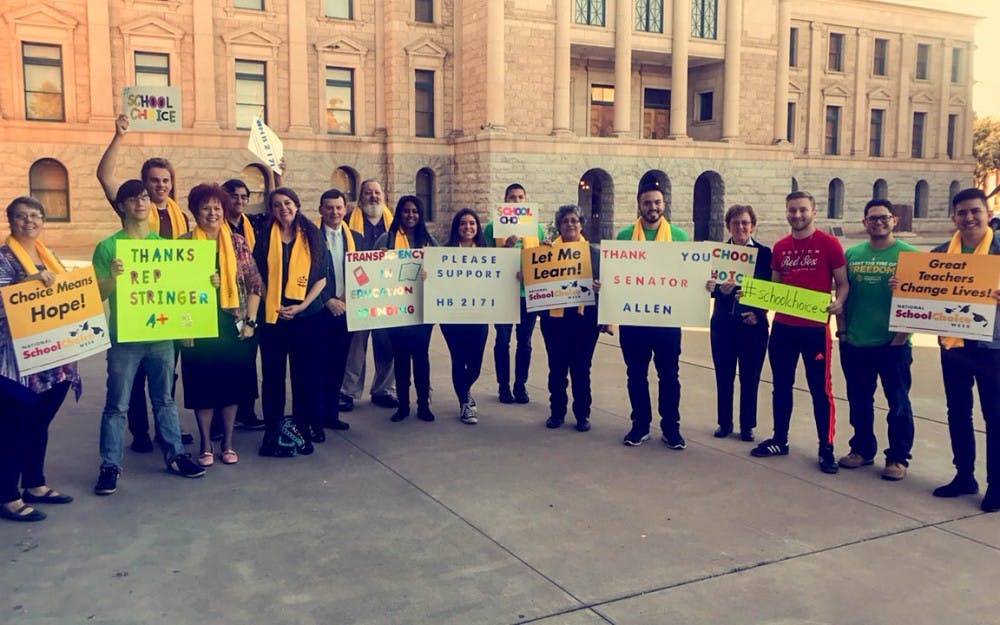School of choice and Empowerment Scholarship Accounts (ESAs) are controversial subjects that have divided political parties for several years. In Arizona, personal choice in education is a huge issue, and the benefits that come from ESAs can have a significant impact on a student’s life.
ASU students should become more involved in advocating for school of choice and ESAs because these ideas can enable more students to attend college.
Enabling more students to take advantage of school choice can create more dynamic and college-ready high school graduates. If college students invest their time into promoting educational reform for K-12 students, they are thereby helping create a more diverse and prepared student body for ASU's future.
While school of choice and ESAs are issues that mainly impact students from elementary to high school, these factors can have a substantial influence on the quality and numbers of students coming into the University.
School of choice is a concept that enables people to choose where their children attend school, regardless of whether it is a public, charter, private, at-home or religious school. This describes the idea that parents have a right to decide where their child receives an education and moves away from a one-size-fits-all model.
"Whether it’s charter schools or ESAs or any of these school of choice options, what we’re really talking about is giving educators enough freedom and flexibility to design schools that work for different kinds of kids," said Andrew Clark, Arizona state director for Americans for Prosperity.
Arizona parents are also given benefits to support school of choice, such as ESA and a lack of mandatory district laws.
ESAs allow families to receive monetary compensation for their child’s education. This allows the parent to choose where their child attends school by giving them funding to pay for tuition, fees, or supplies.
Part of the controversy surrounding ESAs is that if people receive funding to send their children to private or charter schools, it could potentially take away students and funding from public schools.
However, ESAs and school choice have potential to increase competition between schools and allow parents to choose the best fit for their child. If a family resides in a specific district and is assigned to a public school, parents can opt-out of that assignment and send their kid to a private school, courtesy of the ESA funding.
This could prevent low-income families from sending their children to a failing public school out of necessity. If the family is provided with money to send their child to a private school, they could receive a much higher quality of education there than they could at the failing public school.
It is because of this factor that universities like ASU should begin to care about school of choice efforts. If more students have access to quality education, and education becomes more competitive, then universities could expect to see more educated students applying for admission to college.
"Advocating for policy positions, engaging with grassroots activists, door-to-door campaigns, phone banking, calling into legislators, informing constituents about why school of choice is important — that is how students can get involved," said Jeremiah Cota, a field director for Americans for Prosperity.
School of choice may also allow more students to go to college. If a student attends an alternative school and receives a better education than they would have at a public school, they may be more inclined and able to attend college. When students are provided with the necessary resources to thrive, they can find the motivation and ability to further their education and become a impactful part of society.
"It’s important to stress that part of what school of choice would do is kind of tailor your education for that student particularly," Cota said. "This is all about a student who wants to be marketable and competitive. They have to have a solid education and school of choice is going to support that."
School of choice and ESAs not only have potential to increase the quality of students applying for college, but may also be able to increase the number of students applying as well. If low-income students that would otherwise be forced into a failing public school receive financial compensation to attend an alternative school, they are potentially being saved from getting lost in the system and are given the opportunity to continue their education.
ASU students should become invested in school of choice initiatives in order to make improvements to the current system. School of choice and ESAs are not representative of a perfect system, but instead of a system that requires work. College students should be a part of this movement to maximize educational opportunities for all youth.
Reach the columnist at amsnyde6@asu.edu or follow @AnnieSnyder718 on Twitter.
Editor’s note: The opinions presented in this column are the author’s and do not imply any endorsement from The State Press or its editors.
Want to join the conversation? Send an email to opiniondesk.statepress@gmail.com. Keep letters under 500 words and be sure to include your university affiliation. Anonymity will not be granted.
Like The State Press on Facebook and follow @statepress on Twitter.




